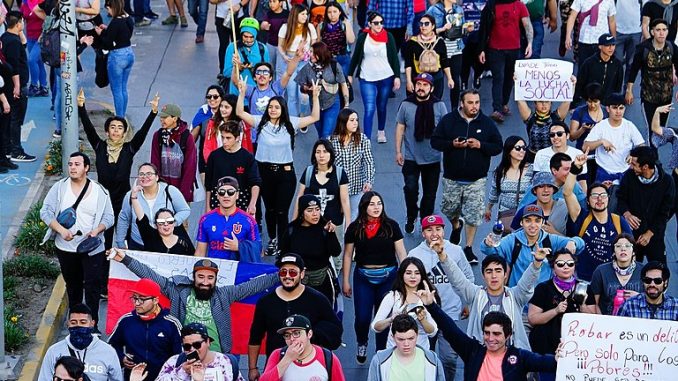
Sometimes people take matters into their own hands and make history. When they do, anything is possible. In the last weeks, revolts have erupted across the globe, with some of the biggest protests ongoing in Lebanon and Chile. The divisions that usually keep people apart are forgotten overnight. Together, the masses of people demand a fundamental change to the governments that maintain the wealthy at the expense of working people. We can learn from their example, and the obvious question to ask is, when is it our turn?
Chile: Public Transit, Public Revolt
In Chile, a revolt began the week of October 7, in response to the government’s decision to raise the price of public transit by 30 pesos, less than 5 cents. It may seem like a small amount, but working class Chilean families spend between 13 and 28 percent of their income on public transportation.
On October 17, students in Chile began the protest by organizing massive fare-evasion, coming in groups to jump the gates at the metro stations. The police came down hard on the students, beating them and arresting hundreds. Thousands of ordinary Chileans flooded the streets in protest, feeling a deep sympathy for the students.
The government announced a state of emergency, deploying troops. Tanks rolled and soldiers marched in the streets but people still marched and protested. Protesters have faced intense repression with 19 people killed and 2,500 injured. The military and police have arrested nearly 3,000 protesters.
In spite of the repression, a two-day general strike spread across the country on Wednesday, the 23 rd . On October 25, over a million people demonstrated throughout Chile to demand President Piñera’s resignation. By October 27, he had fired all of his cabinet ministers. His own resignation may not be far behind.
The demonstrations had an immediate impact – a 20% raise in the basic pension (equivalent to Social Security in the U.S.), programs to lower electricity bills, and a law that would have the government cover the cost of expensive medical bills.
In a few days, the Chilean people forced the government to give them what they needed most.
Lebanon – One Tax Too Many
In the Middle Eastern country of Lebanon, a mass revolt exploded on October 17. The government faces huge debts owed to the World Bank, European Bank, and Saudi Arabia. The debt payments were already costly, requiring huge cuts to spending on social programs. On top of the debt, the cost of fighting recent huge wildfires has made the budget crisis even worse. The rich, of course, were not being asked to foot the bill.
The government of Lebanon, in an attempt to balance its budget, decided to impose taxes on consumer goods, particularly tobacco, gasoline, and the smartphone app, WhatsApp – all taxes that would impact poor and working people.
WhatsApp is the app of choice for inter-personal and family communication in Lebanon. Hundreds of thousands of people flooded the streets to protest the tax and the government scrapped its proposal.
This wasn’t enough to stop the protests. By October 21, a general strike was called and hundreds of thousands of people marched and demonstrated across the country, demanding that the whole government step down. The government immediately passed measures to slash politicians’ wages in half and provide immediate aid to the poor. Even that’s not enough. The protests continue.
The poor and working majority of Lebanese people, historically divided by religion and ethnicity, perhaps more than any other Middle Eastern country, have come together around what matters most, their lives and their futures.
When is It Our Turn?
Just like the people of Chile and Lebanon, we the poor and working people in this country are the ones made to pay for crises. We are the ones who pay whether it is the 2008 economic crash or an environmental crisis like the wildfires raging in California. We have a lot to learn from the Chileans and the Lebanese. If we act together, we can change the course of history in an instant.
Featured image by “SrArancibbia”, licensed under CC-BY-SA 4.0

